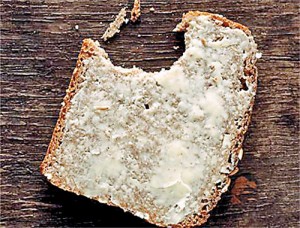Butter is better?
Guidelines that told millions of people to avoid butter and full-fat milk should never have been introduced, say experts.
The startling assertion challenges advice that has been followed by the medical profession for 30 years.

Guidelines from the 1980s that told millions to avoid butter and full-fat milk, should never have been introduced and experts say it lacked any solid trial evidence to back it up (Pic AFP)
The experts say the advice from 1983, aimed at reducing deaths from heart disease, lacked any solid trial evidence to back it up.
Britons were advised by an official dietary committee to cut their fat intake to 30 per cent of total energy and saturated fat intake to 10 per cent, while increasing the amount of carbohydrate they ate.
This led food makers to create low-fat spreads, including cholesterol-lowering products, while consumers shunned cheese, milk and cream.
However, now some scientists even say the advice is responsible – in part – for the obesity crisis because it encouraged an increase in carbohydrate in our diets.
A new review says evidence from trials did not support the advice. It says it is ‘incomprehensible’ that such advice was introduced for 56 million Britons in 1983 and 220 million Americans six years earlier ‘given the contrary results from a small number of unhealthy men’.
‘The present review concludes that dietary advice not merely needs review; it should not have been introduced.’
However, many public health and nutrition scientists criticised the conclusions of the review in the online BMJ journal Open Heart, saying wider evidence at the time and since has justified the advice and heart deaths have fallen dramatically.
The researchers carried out a review of data from trials that would have been available to UK and US regulators at the time. These trials were regarded as the ‘gold standard’ of medical testing.
Six relevant trials were found, spanning an average of five years, and involving 2,467 men – most of whom had survived a heart attack or similar event.
The trials looked at the relationship between dietary fat, cholesterol, and coronary heart disease. The review found no difference in heart deaths, regardless of whether people were on a high fat or lower fat diet. Professor Iain Broom, of the Robert Gordon University in Aberdeen, said there was now mounting evidence against the introduction of low-fat diets to combat heart disease.
Yet governments in both the US and UK have ‘practically destroyed the dairy industry by suggesting that butter, cheese and full fat milk increased cardiovascular disease risk, when the contrary is true,’ he said. Professor Broom also said advice to increase carbohydrate consumption to 50 per cent of energy intake was blamed by some experts for an epidemic of obesity and type 2 diabetes.
The review was led by Zoe Harcombe, Institute of Clinical Exercise and Health Science, University of the West of Scotland, Hamilton, and Dr James DiNicolantonio, Saint Luke’s Mid America Heart Institute, Kansas City.
© Daily Mail, London


